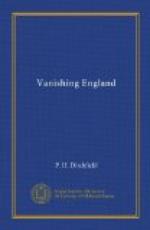[Illustration: Entrance to the Reindeer Inn, Banbury]
And again, on Christmas Eve Irving tells of his joyous long day’s ride in a coach, and how he at length arrived at a village where he had determined to stay the night. As he drove into the great gateway of the inn (some of them were mighty narrow and required much skill on the part of the Jehu) he saw on one side the light of a rousing kitchen fire beaming through a window. He “entered and admired, for the hundredth time, that picture of convenience, neatness, and broad honest enjoyment—the kitchen of an English inn.” It was of spacious dimensions, hung round with copper and tin vessels highly polished, and decorated here and there with Christmas green. Hams, tongues, and flitches of bacon were suspended from the ceiling; a smoke-jack made its ceaseless clanking beside the fire-place, and a clock ticked in one corner. A well-scoured deal table extended along one side of the kitchen, with a cold round of beef and other hearty viands upon it, over which two foaming tankards of ale seemed mounting guard. Travellers of inferior order were preparing to attack this stout repast, while others sat smoking and gossiping over their ale on two high-backed oaken settles beside the fire. Trim housemaids were hurrying backwards and forwards under the directions of a fresh bustling landlady; but still seizing an occasional moment to exchange a flippant word, and have a rallying laugh with the group round the fire.
Such is the cheering picture of an old-fashioned inn in days of yore. No wonder that the writers should have thus lauded these inns! Imagine yourself on the box-seat of an old coach travelling somewhat slowly through the night. It is cold and wet, and your fingers are frozen, and the rain drives pitilessly in your face; and then, when you are nearly dead with misery, the coach stops at a well-known inn. A smiling host and buxom hostess greets you; blazing fires thaw you back to life, and good cheer awaits your appetite. No wonder people loved an inn




